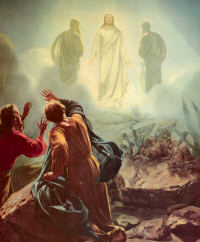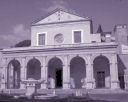
Daily Readings for: February 24, 2013
(Readings on USCCB website)
Collect: O God, who have commanded us to listen to your beloved Son, be pleased, we pray, to nourish us inwardly by your word, that, with spiritual sight made pure, we may rejoice to behold your glory. Through our Lord Jesus Christ, your Son, who lives and reigns with you in the unity of the Holy Spirit, one God, for ever and ever.
Lent: February 24th
Second Sunday of Lent
Old Calendar: Second Sunday of Lent
Between Moses and Elias Jesus shows forth His divine glory, thus foreshadowing His resurrection. He is the Alpha and the Omega, the beginning and the end of all things. Today's Mass places before us the transfigured Lord and the model toward Whom we must tend, and our own transfiguration as the goal we must attain. We attain this goal by a profound realization of our sinfulness and need of a Redeemer; by preserving purity of body and soul; by combatting our passions and carnal instincts and observing the commandments and most importantly by participating in the Mass. — Excerpted from Cathedral Daily Missal
Sunday Readings
The first reading is taken from the book of Genesis 15:5-12; 17-18. God made a Covenant or pact with Abram in which he promised to make Abram the father of a great race to which he would give the land of Canaan as their territory. The faith of Abram is praised because he believed God's promise, I.e. that he would have descendants even though his wife Sarah was barren.
The second reading is from the letter of St. Paul to the Philippians 3:17; 4:1. In the preceding verses St. Paul has been telling his converts that he has given up all earthly things for the sake of the Christian faith and promise. He admits he is far from perfect but he continues to press forward on the road to heaven.
 The Gospel is from St. Luke 9:28-36. It was out of the abundance of his divine love that God gave a glimpse of the future glory of Christ in his risen humanity to the three disciples on that memorable occasion. And with Christ he showed two others of his faithful servants also in glory. He understood the human weakness of the disciples, and foresaw the shock to their faith which the sad scenes of the passion and crucifixion of their beloved Master would be some weeks later. So, to strengthen and forearm them for that sad trial, he gave them a glimpse of the future glory which was to be theirs, too. if they persevered.
The Gospel is from St. Luke 9:28-36. It was out of the abundance of his divine love that God gave a glimpse of the future glory of Christ in his risen humanity to the three disciples on that memorable occasion. And with Christ he showed two others of his faithful servants also in glory. He understood the human weakness of the disciples, and foresaw the shock to their faith which the sad scenes of the passion and crucifixion of their beloved Master would be some weeks later. So, to strengthen and forearm them for that sad trial, he gave them a glimpse of the future glory which was to be theirs, too. if they persevered.
It is for this same reason that this all-important event in the life of Christ and of his Apostles has been preserved for us in the Gospels and is put before us today.
Like the Apostles, we. too, believe firmly in God. We. too, are convinced that Christ was sent by God to bring us to heaven. We now have much more convincing proof that Christ was not only the Messiah, an envoy of God, but the very Son of God—something the Apostles did not then understand. But we are still very like them in our human weakness, and in our half-hearted acceptance of God's purpose for and promises to us.
The Apostles had to face the awful test to their faith and trust in God, which the passion and crucifixion of Christ was for them. We now accept with gratitude and realize that Christ "had to suffer and thus enter into his glory." We even understand that the very purpose of Christ's passion was that, in spite of our mortality and weakness, we also might enter into eternal glory through his suffering, on condition that we remain true to our faith.
In our moments of cool, calm reasoning we can see clearly how good God has been to us, how wonderful his love which has arranged for us an eternity of happiness, the perfect fulfillment of every rational human desire. We can also see how little God asks of us during our few short years here, in return for the everlasting happy home he has prepared for us.
But unfortunately we have many moments in life in which cool, calm reasoning does not prevail. We have moments when our vices and not our virtues take charge, moments when we are prepared to sell our eternal heritage in exchange for a mess of earthly pottage. Some of us may already have bartered our heavenly home for some temporal gain or pleasure—but while there is life there is hope. We can still put things right with God.
"Lord, it is good for us to be here"; it is wonderful to be adopted sons of God on the road back to our Father. It is wonderful to be assured that in death this body of ours with its pains and aches, its attraction to earthly things and worse still its propensity to sin, will give place to a glorified body. This glorified body will be free from all pain and corruption and will possess all the human spiritual gifts of intelligence and will to so much greater a degree as will enable us to appreciate and enjoy the eternal happiness in store for us.
Excerpted from The Sunday Readings by Fr. Kevin O'Sullivan, O.F.M.

The Station at Rome is in the church of St. Mary in Dominica, on Monte Celio. Tradition tells us that in this basilica was the diaconicum of which St. Lawrence had charge, and from which he distributed to the poor the alms of the Church.